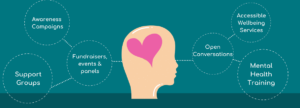The media portrays lawyers as successful, detail- oriented, “type A” people. On television shows and movies lawyers are portrayed as naturally brilliant and able to solve a case within minutes. This is rarely the case in real life, dedicating your studies to law is no simple task. People overlook that often lawyers face immense pressure while at work. They are tasked with preparing for a case, public speaking, deciding between right and wrong, constant analysis, finding loopholes, advising clients with trauma and much more. Not to mention the added pressure to vindicate their clients. It’s no wonder that mental health issues in the legal world are rising.
Have You Heard?
According to Melanie Pritchard from American Lawyer Media International a media company that delivers content for professionals in certain sectors such as the legal industry, states the following:
- 28% of lawyers suffer from depression, compared with less than 8% of the general population
- 19% are struggling with anxiety
- 21 to 36% of lawyers qualify as problem drinkers
- 59% of barristers demonstrate unhealthy levels of perfectionism and
- nearly 40% of law students deal with depression
And did you know? According to Mental Health First Aid England “69% of UK line managers say that supporting employee wellbeing is a core skill, but only 13% have received mental health training.”
Why Am I Passionate About Advocating for Mental Health?
I struggle with anxiety, OCD and depression, and as a law student I was embarrassed to talk about my own mental health issues. I didn’t want to feel judged, neither did I want to feel pitied by my peers or the faculty staff. I often felt the pressure of being perfect as I would see other lawyers on television shows and movies. My days consisted of finding myself constantly comparing myself to my peers. Not only was I embarrassed about my situation, but I was scared to have an open conversation. Will my peers think of me differently? Will my professors grade me differently? Thousands of questions floated around in my head.
This made me realise that our present-day society needs to give those who suffer with mental health issues the opportunity to talk about mental illness without feeling ashamed. It’s important to have awareness days, campaigns, apps and support around wellbeing for this reason.
Implementing more programs and bringing awareness
We, as human beings, need to go back the basics – nowadays media in attempting to create a stronger social connection, has caused us all to be more disconnected than ever. Opening up to someone is harder, therefore, it’s important to have law firms and universities trained to deal with these issues. Initial steps could include awareness days where law firms take the time to learn about the effects of mental health. Additionally, panels, events, and campaigns and fundraisers can be helpful. Similarly, training programs can be developed for managers and staff with higher authority. The ultimate goal would be having resources such as counselling and wellbeing services within quick reach. Any step in this direction is the right step to start breaking the stigma with mental health as it allows conversations to take place.

Remember: Your battles are your biggest achievements
Earlier I said I use to be embarrassed to talk about my mental health, but I’ve realised that the battles I’ve faced with my mental health are my biggest achievements. I’ve worked so hard to battle my panic attacks, my depressive thoughts and my OCD episodes especially during a global pandemic. Most importantly, here I am writing about my struggles for everyone to see. This is because I know many others that feel the same as well. You may feel how I felt but know that there are people that are willing to listen and have an open conversation with you. I have provided details below on where you can seek help if you need it.
It’s not until everyone can have the willingness to have an open conversation about mental health that the stigma will start to break down.

Law Firms that Have Taken a Step in the Right Direction
Law Firms such as Baker McKenzie have a network called “Baker Wellbeing” which promotes and focuses on physical and mental health through the form of campaigns and support groups. Other firms such as Hogan Lovells have lunched a mental health platform called Unmind, where associates can access and track their wellbeing and mental health through their personal devices.
What Has the University of Birmingham Done?
The University of Birmingham (UoB) has specific wellbeing officers for each faculty (for example the college of Arts and Law or the College of Social Sciences) who are able to guide you in the right direction when you are facing a problem or crisis. I’ve spoken to my wellbeing officers and they have been extremely kind and excellent in giving advice and helping me. In my first year of University as an international student, I had difficulties adjusting to a new way of life, and my wellbeing officer was able to help me navigate my problems. UoB also has a great student support service located in Aston Webb Building for those struggling with wellbeing and disabilities. You can book appointments by calling this number 0121 414 5130. Alternatively, students can also speak to the Guild of Students who can give confidential advice on issues relating to academics, housing, finance, wellbeing and international support.
It’s important to keep implementing programs like this not only through the education system but at law firms as well. Let’s keep encouraging everyone to speak about their experience. Let’s start to break down the stigma one step at a time.
Helpful Links:
- Law Care (Emotional support line for anyone in the UK legal community)
Helpline: 0800 279 6888
Email: support@lawcare.org.uk
- Birmingham and Solihull’s Mental Health Trust (Urgent mental health support)
Helpline: 01212623555
- Forward Thinking Birmingham (24-hour crisis team)
Helpline: 0300 300 0099
- Text Helpline (For support during personal crisis)
Text SHOUT to 85258 (24/7 text service)
By Rafia
